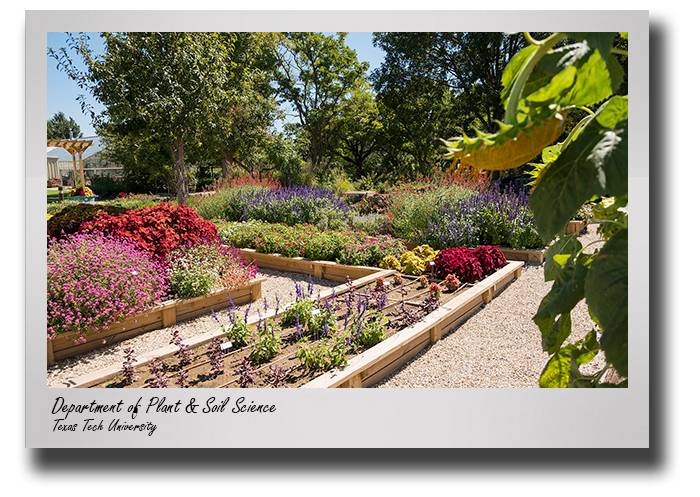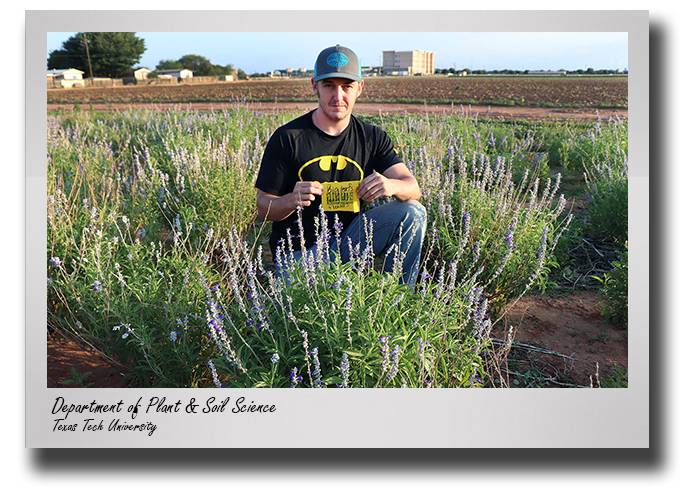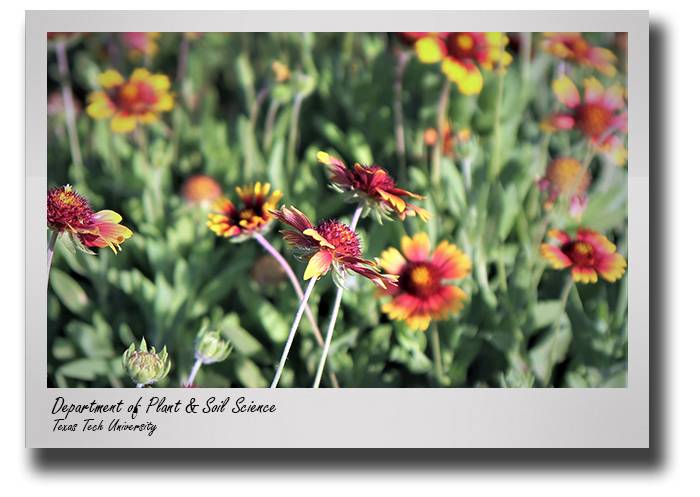CASNR’s ornamental horticulture research is providing vibrant results
By: George Watson
 Every spring at Texas Tech University, the flower beds, as well as other areas all
over campus, get spruced up with new and colorful flowers. It's a sign that warmer
weather is on the way and the campus will once again display its beauty to visitors,
alumni, students, faculty and staff over the next few months.
Every spring at Texas Tech University, the flower beds, as well as other areas all
over campus, get spruced up with new and colorful flowers. It's a sign that warmer
weather is on the way and the campus will once again display its beauty to visitors,
alumni, students, faculty and staff over the next few months.
But did you ever wonder about the process for which some flowers or plants are chosen? Well, a field of study in the Department of Plant and Soil Science might have played a part in that. Ornamental horticulture is the study of growing, arranging and tending plants for decorative and aesthetic use.
Led by instructor Russ Plowman, students research and experiment with different plant breeds to intensify their beauty and study and improve their tolerance to the semi-arid climate on the South Plains.
 "You have to have plants that are pretty tough," Plowman said. "There are different
kinds of plants – drought tolerant, non-drought tolerant, xerophytic plants. A lot
of people have heard of xeriscape, but it doesn't mean that it's all cactus and things
like that. It's just plants that use water really well, and what you find is the plants
that are native to your area, they are going to use water in a way that your area
gets through natural rainfall."
"You have to have plants that are pretty tough," Plowman said. "There are different
kinds of plants – drought tolerant, non-drought tolerant, xerophytic plants. A lot
of people have heard of xeriscape, but it doesn't mean that it's all cactus and things
like that. It's just plants that use water really well, and what you find is the plants
that are native to your area, they are going to use water in a way that your area
gets through natural rainfall."
Through ornamental horticulture, Plowman and his students explore methods for designing plant and flower displays that can be used in places like golf courses, therapy, greenhouses and public and private businesses. But ornamental horticulture also is used to improve the capacity of ornamental plants for the production of oils.
Not only are ornamental plants attractive, they can improve the quality of life. They have been shown to improve air quality, cut down on the time people spend in hospitals and improve employee attendance. Plowman said ornamental horticulture also can help cool a house through the use of trees, vegetation, grasses and flowers.
"Of course, all plants provide oxygen, so that's part of it," Plowman said. "But, really, the whole goal of ornamental horticulture is growing plants for their interest and their beauty."
 The focus of Plowman and his students is on sustainable landscape and the role of
ornamental horticulture. Their goal is to develop vegetation that is economical to
grow and maintain and that requires a minimum amount of water, fertilizer and pest
control chemicals while maximizing the benefits of ornamental plants and minimizing
their environmental impact.
The focus of Plowman and his students is on sustainable landscape and the role of
ornamental horticulture. Their goal is to develop vegetation that is economical to
grow and maintain and that requires a minimum amount of water, fertilizer and pest
control chemicals while maximizing the benefits of ornamental plants and minimizing
their environmental impact.
For that purpose, Plowman's research focuses on wildflowers, not just in the United States, but those that are native to West Texas and the South Plains. "We're looking at improving native wildflower populations to get better standing plants, bigger flowers, a better show and even more drought resistance," Plowman said.
Plowman researches and experiments mostly with salvias, Indian blankets, Mexican hats and a few other native wildflowers because of their beauty in the landscape. His goal is to get them to bloom more vividly, more frequently and do so on a yearly basis.
 He said how plants grow on the South Plains is vastly different than how they grow
in even some of the closer regions like the Big Country, Permian Basin and Concho
Valley. That leads Plowman and his students to devote time researching certain non-native
plants that could be adapted to this climate. Currently, they are looking at plants
like persimmons and pomegranates for their sustainability to the area.
He said how plants grow on the South Plains is vastly different than how they grow
in even some of the closer regions like the Big Country, Permian Basin and Concho
Valley. That leads Plowman and his students to devote time researching certain non-native
plants that could be adapted to this climate. Currently, they are looking at plants
like persimmons and pomegranates for their sustainability to the area.
So part of the research in ornamental horticulture involves what Plowman called "trialing," where researchers grow certain plants, provide minimum amounts of water, no fertilizer, and grow them throughout the spring and summer to determine how well they will grow in the natural environment.
"The plants that would live in New Mexico or far West Texas would do really well here, so we're looking to expand our plant populations," Plowman said.
CONTACT: Eric Hequet, Department Chair, Department of Plant and Soil Science, Texas Tech University at (806) 742-2838 or eric.hequet@ttu.edu
0320NM19 / Editor's Note: For full text version of George Watson's article from Texas Tech University's Marketing and Communications Office, click here
Davis College NewsCenter
-
Address
P.O. Box 42123, Lubbock, Texas 79409-2123, Dean's Office Location:Goddard Building, Room 108 -
Phone
(806)742-2808 -
Email
kris.allen@ttu.edu
